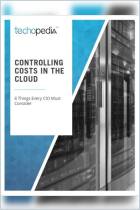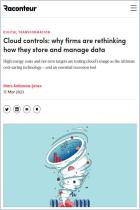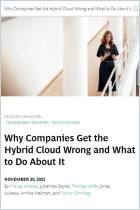There’s explosive growth in cloud computing, with businesses such as Microsoft, Google, and Amazon spending billions on the technology. Research shows that just under a third of IT leaders are planning to follow suit, investing in the cloud. However, managing your cloud transformation can be tricky: You risk losing money, tarnishing your reputation, and damaging stakeholder relationships if you navigate the transition the wrong way. Gain insight into how best to avoid “common traps” and maximize your chances of a successful transformation.
To remain competitive, organizations should harness the benefits of cloud computing, while mitigating risks.
Cloud computing spending has risen rapidly in recent years: At Amazon, Microsoft, and Google, spending increased by $148 billion in just five years, reaching $211 billion by 2023. According to Boston Consulting Group research, 30% of IT leaders plan to boost cloud spending during the next year. When properly implemented, cloud computing can be more efficient, flexible, fast, and affordable than in-house IT solutions. In fact, switching to a cloud-based model can lower your infrastructure costs by as much as 40%, while accelerating your time to market by up to 60% and elevating productivity up to 50%.
Cloud migration isn’t always a straightforward or smooth process though. There’s a lot at stake when it comes to successfully managing your cloud transformation: If you switch to the cloud without proper planning and coordination you might see financial losses due to rising costs, project delays, and resource mismanagement. You risk missing opportunities, frustrating your customers, attracting scrutiny from regulators and investors...
Krishnan Ramachandran, Richard Bennett, Steven Alexander Kok, Jon Brock, Sukand Ramachandran, Magnus Morin, and Sesh Iyer are professionals with Boston Consulting Group.






















Comment on this summary or Comenzar discusión